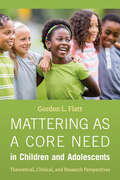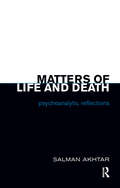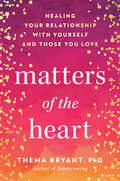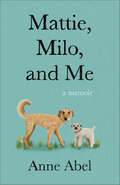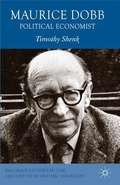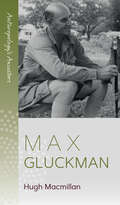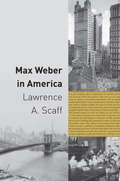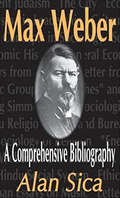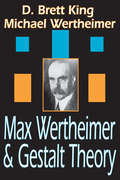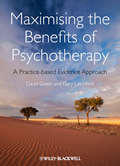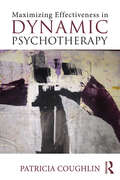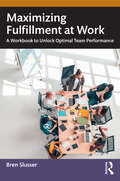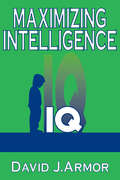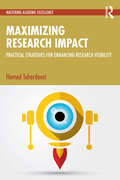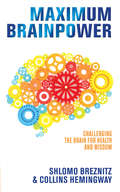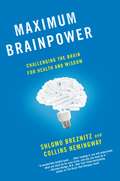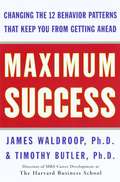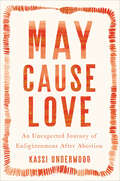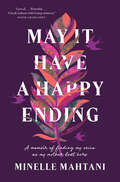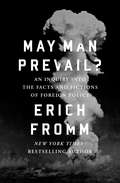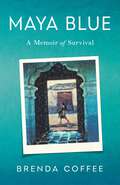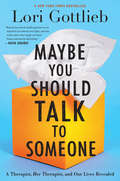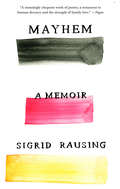- Table View
- List View
Mattering as a Core Need in Children and Adolescents: Theoretical, Clinical, and Research Perspectives
by Gordon L. FlettThis book summarizes the psychological research on the concept of mattering in children and adolescents, and outcomes associated with the presence or absence of feelings of being valued by others. Mattering, the felt experience of being valued and necessary to others, is a unique and complex psychological construct. Differences in children&’s sense of mattering to their family, friends, and significant others predict consequential outcomes at the individual, relationship, and societal levels. Gordon Flett offers important, evidence-based insights from the psychological literature, drawing clear links between a lack of mattering and measures of children's depression, anxiety, suicide risk, aggression and violence. Conversely, he shows how mattering to others is reflected in measures of resilience, adaptability, motivation, and performance. Crucial links are also explored between social marginalization and mattering, and case material is used throughout the book to illustrate key points. The clinical chapters describe mental health interventions that measure and address issues related to children&’s sense of mattering in family, school, and community contexts.
Matters of Life and Death: Finding the Words to Say Goodbye
by Carol WogrinPlenty of books explore the emotions of coping with grief and a loved one's death. But as psychologist Carol Wogrin has observed, there is little advice for those at a loss for words witnessing the process of dying. Matters of Life and Death discusses the importance of communicating with the terminally ill both through talking and nonverbal expression and offers suggestions for what to say to offer comfort, both emotional and physical.
Matters of Life and Death: Psychoanalytic Reflections
by Salman AkhtarThis book focuses on the intrapsychic vicissitudes of what it means to be truly alive and how death accompanies us at each step of our life's journey. It shows that, psychologically-speaking, death is always present in life and life in death.
Matters of the Heart: Healing Your Relationship with Yourself and Those You Love
by Thema Bryant Ph.D.A groundbreaking, heart-centered road map for everyone who seeks greater fulfillment in their relationships—with family, friends, romantic partners, and themselvesAs a psychologist and minister with more than twenty years of experience, Dr. Thema understands how challenging it can be to create and cultivate healthy relationships—and how critical it is for our well-being. Matters of the Heart draws on the wisdom of science, sacredness, and lived experience to help readers tend to the garden of their hearts and build their best relational lives.Love is not a level playing field, and improving your relationship with yourself, which includes healing trauma and setting boundaries, is often the first step toward leveling the field. Dr. Thema shares evidence-informed practices, traits, and skills that can enhance your relationships overall, as well as solutions to challenges within common relationship dynamics. With her wise and compassionate guidance, delve into:• hot topics such as control issues, emotional unavailability, and releasing someone who doesn&’t love you• practical activation activities to apply what you learn from each chapter• case studies that illuminate the process of healing and growing your heart• how to shift your mindset and patterns around romance• and so much moreOne of the major predictors of wellness is the nature of our relationships. Our culture is in a mental health crisis, exacerbated by the loneliness of the digital age and realities of post-pandemic society. Whether you are trying to level up a happy relationship or rebuild trust after an unhappy one, Matters of the Heart will empower you to connect to yourself and to others, heal your heart, and thrive in all areas of your life.
Mattie, Milo, and Me: A Memoir
by Anne AbelAnne grew up in an abusive home, leading to severe depression and a determination to do better as a mother. One of her sons wants a dog from the time he is a baby; Anne very much does not. For years she appeases him with creatures who live in cages and tanks, but on his tenth birthday she can no longer say no—and she proceeds to fall in love with their new four-legged family member, Mattie. Then Mattie dies a sudden and tragic death, and Anne feels herself begin to sink back into depression.Trying to cope, she immediately adopts Milo—a dog who, unbeknownst to her, has already been returned to the rescue by several families due to his aggressive behavior. But even after she realizes Milo is dangerous, she’s committed to trying to give him a chance at a good life.Anne’s journey takes the reader from dog school into the deep woods as she perseveres with Milo’s lifelong rehabilitation and her unwavering efforts to be a good mother to her sons. Working with Milo strengthens Anne and expands her ability to love. Ten years later, when Milo dies, Anne faces another choice: close the door to that part of her heart, or risk loving another dog after two tragic losses?
Maurice Dobb: Political Economist
by Timothy ShenkThis book explores the life of the man whom even his critics acknowledged was one of the world's most significant Communist economists. From his outpost at the University of Cambridge, where he was a protégé of John Maynard Keynes and mentor to students, Dobb made himself into one of British communism's premier intellectuals.
Max Gluckman (Anthropology's Ancestors #6)
by Hugh MacmillanThis handy, concise biography describes the life and intellectual contribution of Max Gluckman (1911-75) who was one the most significant social anthropologists of the twentieth century. Max Gluckman was the founder in the 1950s of the Manchester School of Social Anthropology. He did fieldwork among the Zulu of South Africa in the 1930s and the Lozi of Northern Rhodesia/Zambia in the 1940s. This book describes in detail his academic career and the lasting influence of his Analysis of A Social Situation in Modern Zululand (1940-42) and of his two large monographs on the legal system of the Lozi. From the Introduction: Max Gluckman was the most influential of a group of social anthropologists who emerged from South Africa during the 1930s into what was essentially a new academic discipline. His description and analysis of events in real time implied a rejection of contemporary social anthropological practice, of the ‘ethnographic present’, and of hypothetical or conjectural reconstructions and an acceptance of the need to study ‘primitive’ societies in the context of the modern world.
Max Weber in America
by Lawrence A. ScaffMax Weber, widely considered a founder of sociology and the modern social sciences, visited the United States in 1904 with his wife Marianne. The trip was a turning point in Weber's life and it played a pivotal role in shaping his ideas, yet until now virtually our only source of information about the trip was Marianne Weber's faithful but not always reliable 1926 biography of her husband.Max Weber in America carefully reconstructs this important episode in Weber's career, and shows how the subsequent critical reception of Weber's work was as American a story as the trip itself. Lawrence Scaff provides new details about Weber's visit to the United States--what he did, what he saw, whom he met and why, and how these experiences profoundly influenced Weber's thought on immigration, capitalism, science and culture, Romanticism, race, diversity, Protestantism, and modernity. Scaff traces Weber's impact on the development of the social sciences in the United States following his death in 1920, examining how Weber's ideas were interpreted, translated, and disseminated by American scholars such as Talcott Parsons and Frank Knight, and how the Weberian canon, codified in America, was reintroduced into Europe after World War II. A landmark work by a leading Weber scholar, Max Weber in America will fundamentally transform our understanding of this influential thinker and his place in the history of sociology and the social sciences.
Max Weber: A Comprehensive Bibliography (The\international Library Of Essays In Classical Sociology Ser.)
by Alan SicaThe most profound and enduring social theorist of sociology's classical period, Max Weber speaks as cogently to concerns of the new century as he did to those of the past. In Max Weber and the New Century, Alan Sica demonstrated Weber's preeminent position and lasting vitality within social theory by applying his ideas to a broad range of topics of contemporary concern. Max Weber: A Comprehensive Bibliography is a companion volume that offers some 4,600 bibliographic listings of work on Weber, making it the most complete guide to the literature in English and a testament to the continued vitality of Weber's thought. Sica's work supersedes all previous bibliographical efforts covering the Weber literature, both in the quantity and accuracy of its references, and the clarity and convenience of its format. In order to demonstrate the enormous variety of Weberiana in English, Sica has adopted a liberal criterion for inclusion, rather than a critical one, choosing to mix the best with what may be more routine work. Following a preface in which previous bibliographies and bibliographic problems are discussed, the volume opens with a series of five specialized bibliographies. The first lists Weber's works in English translation. The second lists reviews of Weber's major works including those translated into English, while the third covers reviews of recent books and other work on Weber. The fourth section contains a selection of dissertations and theses relating to Weber or his ideas. The fifth includes primary and secondary sources treating Weber on rationality and rationalization processes. The last and largest section offers a comprehensive Weber bibliography of works in English. This large-scale endeavor attempts to identify with accuracy and completeness the entire universe of Weber scholarship in English. It will be an essential scholarly tool for sociologists, historians, economists, and students of cultural and intellectual history.
Max Wertheimer and Gestalt Theory
by Michael WertheimerThe ideas of Max Wertheimer (1880-1943), a founder of Gestalt theory, are discussed in almost all general books on the history of psychology and in most introductory textbooks on psychology. This intellectual biography of Wertheimer is the first book-length treatment of a scholar whose ideas are recognized as of central importance to fields as varied as social psychology, cognitive neuroscience, problem solving, art, and visual neuroscience.King and Wertheimer trace the origins of Gestalt thought, demonstrating its continuing importance in fifteen chapters and several supplements to these chapters. They begin by reviewing Wertheimer's ancestry, family, childhood in central Europe, and his formal education. They elaborate on his activities during the period in which he developed the ideas that were later to become central to Gestalt psychology, documenting the formal emergence of this school of thought and tracing its development during World War I. The maturation of the Gestalt school at the University of Berlin during 1922-1929 is discussed in detail.Wertheimer's everyday life in America during his last decade is well documented, based in part on his son's recollections. The early reception of Gestalt theory in the United States is examined, with extensive references to articles in professional journals and periodicals. Wertheimer's relationships and interaction with three prominent psychologists of the time, Edwin Boring, Clark Hull, and Alexander Luria, are discussed based on previously unpublished correspondence. The final chapters discuss Wertheimer's essays on democracy, freedom, ethics, and truth, and detail personal challenges Wertheimer faced during his last years. His major work, published after his death, is Productive Thinking. Its reception is examined, and a concluding chapter considers recent responses to Max Wertheimer and Gestalt theory.This intellectual biography will be of interest to psychologists and readers inte
Maximising the Benefits of Psychotherapy
by David Green Gary LatchfordMaximising the Benefits of Psychotherapy critiques Evidence-Based Practice and describes other approaches to improving the effectiveness of therapy, such as Practice-Based Evidence and the use of client feedback. The authors include a summary of key research findings and an accessible guide to applying these ideas to therapeutic practice.Puts forward a critique of existing research claiming that certain psychotherapy programmes are more effective than others in treating specific disordersIncludes an accessible summary of key research findings, a practical introduction to a practice-based evidence approach, and a series of detailed case studiesOffers a timely alternative to the prevailing wisdom in the mental health field by challenging the practical logic of the Evidence-Based Practice approachReviews the empirical evidence examining the effects of client feedback on psychotherapy outcomes
Maximizing Effectiveness in Dynamic Psychotherapy
by Patricia CoughlinThe best therapists embody the changes they attempt to facilitate in their patients. In other words, they practice what they preach and are an authentic and engaged, as well as highly skilled, presence. Maximizing Effectiveness in Dynamic Psychotherapy demonstrates how and why therapists can and must develop the specific skills and personal qualities required to produce consistently effective results. The six factors now associated with brain change and positive outcome in psychotherapy are front and center in this volume. Each factor is elucidated and illustrated with detailed, verbatim case transcripts. In addition, intensive short-term dynamic psychotherapy, a method of treatment that incorporates all these key factors, is introduced to the reader. Therapists of every stripe will learn to develop and integrate the clinical skills presented in this book to improve their interventions, enhance effectiveness and, ultimately, help more patients in a deeper and more lasting fashion.
Maximizing Fulfillment at Work: A Workbook to Unlock Optimal Team Performance
by Bren SlusserThis practical workbook provides guidance for applying tacit knowledge to the field of Human Resource Management (HRM) to promote positive workplace culture and creativity.Based on theories presented in Examining Creativity in the Workplace by Nahanni Freeman and Bren Slusser, the workbook looks at five key areas of tacit knowledge, showing its importance in any organization to promote creativity and innovation in the workplace. Each section begins with a summary of key research and concepts that are supported by case studies, discussion questions and other practical activities to solidify understanding of the terms and ideas learned and unlock optimal team performance. With its accessible structure, it highlights how cultural diversity is a must within any organization for the successful formation of social networks where tacit knowledge can be transferred, and suggests how HRM activities and best practices are critical for increasing engagement and fostering a positive working environment that lets innovation thrive.Suitable as a standalone text or alongside Examining Creativity in the Workplace, this workbook is the ideal resource for use as part of corporate-level training for practitioners, as well as in the classroom for scholars and postgraduate students in Human Resource Management and Behavioral Psychology programs.
Maximizing Intelligence
by David J. ArmorThe "nature versus nurture" controversy dates back to at least the nineteenth century. How much of a role does genetics or environment play in accounting for reasoning skill and other intellectual aptitudes? At a time when the public school system in the United States is under attack, this debate has taken center stage in arguments about what accounts for differences in academic achievement. Maximizing Intelligence convincingly argues that, while both genetics and environment play a role in a child's intelligence, environmental factors, especially at an early age, are of primary importance. Working from this premise, Armor suggests how intelligence may be heightened.Armor presents four propositions about intelligence. His first is that intelligence exerts a major influence on educational and occupational success, following a chronological sequence, from a child's cognitive skills learned before school, to academic success during the school years, to eligibility for college. His second proposition is that intelligence can be changed, at least within limits. There is ample evidence that a child's intelligence is not fully given at birth, but continues to evolve and change at least through the early elementary school years, although at a declining rate.Proposition three is that intelligence is influenced by a series of "risk factors," and most of the influence occurs before a child reaches school age. Risk factors include parent intelligence and education, family income, family structure and size, nutrition, and specific parenting behaviors. The fourth proposition flows from the second and third--that the most promising avenues for maximizing intelligence come from a child's parents. Armor persuasively argues for a "whole family" approach whereby government programs are modified or created to inform parents of risk factors and to reward behaviors that optimize positive outcomes.Maximizing Intelligence is meticulously researched
Maximizing Research Impact: Practical Strategies for Enhancing Research Visibility (Mastering Academic Excellence)
by Hamed TaherdoostMaximizing Research Impact: Practical Strategies for Enhancing Research Visibility offers a comprehensive guide for researchers, academics, and practitioners across disciplines who wish to increase the visibility, accessibility, and influence of their research outputs.This book addresses the challenges and opportunities presented by the rapidly evolving research landscape, including the rise of digital platforms, open access publishing, and the importance of interdisciplinary collaboration. It provides actionable strategies to navigate these changes effectively and ensure that research is not only published but also widely disseminated, recognized, and utilized.Designed for a diverse audience, this will be suitable for early-career researchers, established scholars, and graduate students seeking to build or enhance their academic presence. It will also be useful for research administrators and managers looking to support and promote research within institutions, as well as interdisciplinary and collaborative researchers aiming to navigate and leverage diverse networks. Additionally, the book offers insights for science communicators and media professionals involved in disseminating research to the public.
Maximum Brainpower: Challenging the Brain for Health and Wisdom
by Shlomo Breznitz Collins HemingwayWritten by internationally renowned cognitive psychologist Shlomo Breznitz and technologist Collins Hemingway, Maximum Brainpower is filled with colourful real-life stories and fascinating psychological experiments that show you how to make the most of your grey matter. This book is not only a fascinating tour of the science of the mind, it also shows how you can improve your mental abilities, extend your thinking to its highest levels and ensure your brain fitness in the future. • Why challenge and stimulus improves your brain and how to harness this process• How to separate good stress from bad• What role hope and socialising play in fighting off the worst symptoms of dementia.• How sudoku and crossword puzzles are actually little help to your brain power • Why multitasking can be detrimental to your mental health. This revelatory work will help adults of any age build and retain their mental acuity. Expand your brainwidth to think better, live better, be better with Maximum Brainpower.
Maximum Brainpower: Challenging the Brain for Health and Wisdom
by Shlomo Breznitz Collins HemingwayWe all understand the importance of daily exercise in keeping physically fit. But mental exercise is just as essential to our health and well-being--especially when it comes to defending against forgetfulness, memory loss, and even dementia. These and other age-associated afflictions were once regarded as all but inevitable, but in fact, as this eye-opening, inspiring book shows, there is much we can do to protect ourselves as we grow older. With the right tools, we can all maximize our brainpower and keep our minds sharp, healthy, and cognitively fit throughout life. Written by internationally renowned cognitive psychologist Shlomo Breznitz and technologist Collins Hemingway, Maximum Brainpower provides both an in-depth look at how the brain works and proven methods to increase its capabilities. Armed with the results of cutting-edge research, Breznitz and Hemingway champion in compelling detail the challenge and stimulus of continual change over the deadening effects of comfortable routine. They show how to separate good mental stress from bad, and demonstrate how hope and socialization can help delay or even fight off the worst symptoms of dementia. Did you know that experts are often less mentally agile than jacks-of-all-trades? That mental exercises such as crossword puzzles and sudoku are of minimal help in building brainpower? That multitasking poses unique dangers to the brain by presenting us with an environment in which we never evolved enough to thrive? Breznitz knows--and what's more, he knows what to do about it. Filled with colorful real-life stories and fascinating psychological experiments, many published here for the first time, this revelatory work will help adults of any age build and retain their mental acuity. Think better, live better, be better with Maximum Brainpower. Really, it's a no-brainer!From the Hardcover edition.
Maximum Success
by James Waldroop Timothy ButlerMaximum Success is a compelling exploration of the behavior patterns that cause people to undermine their careers - as well as specific advice on how to overcome them. Have you ever wondered why some people seem to rise effortlessly to the top, while others are stuck in the same job year after year? Have you ever felt you are falling short of your career potential? Have you wondered if some of the things you do - or don't do - at work might hamstringing your ambitions? In Maximum Success, James Waldroop and Timothy Butler, directors of MBA career development at Harvard Business School, identify the twelve habits that over and over again - whether you are a retail clerk or a partner in a law firm are almost guaranteed to hold you back.
May Cause Love: An Unexpected Journey of Enlightenment After Abortion
by Kassi UnderwoodIn this powerful memoir, a fiercely honest and surprisingly funny testament to healing after abortion, a young woman travels across the United States to meet a motley crew of spiritual teachers and a caravan of new friends.At age nineteen, Kassi Underwood discovered she was pregnant. Broke, unwed, struggling with alcohol, and living a thousand miles away from home, she checked into an abortion clinic. While her abortion sparked her “feminist awakening,” she also felt lost and lawless, drinking to oblivion and talking about her pregnancy with her parents, her friends, strangers-anyone. Three years later, just when she had settled into a sober life at her dream job, the ex-boyfriend with whom she had become pregnant had a baby with someone else. She shattered. In the depths of a blinding depression, Kassi refused to believe that she would “never get over” her abortion. Inspired by rebellious women in history who used spiritual practices to attain emotional freedom, Kassi embarked on a journey of recovery after abortion-a road trip with pit stops at a Buddhist “water baby” ritual, where she learns a new way to think about lost pregnancies; a Roman Catholic retreat for abortion that turns out to be staffed with clinic picketers; a crash course in grief from a Planned Parenthood counselor; a night in a motel with a “Midwife for the Soul” who teaches her how to take up space; and a Jewish “wild woman” celebration led by a wise and zany rabbi. Dazzling with warmth and leavened by humor, May Cause Love captures one woman’s journey of self-discovery that enraged her, changed her, and ultimately enlightened her.
May It Have a Happy Ending: A Memoir of Finding My Voice as My Mother Lost Hers
by Minelle MahtaniA searing, intimate and blisteringly honest memoir about mothers and daughters, grief and healing, and finding your voice.Minelle Mahtani had taken a leap of faith. A new mother in a new life, she'd moved across the country for love, and soon found herself facing the exciting and terrifying prospect of hosting her own radio show. But as she began to find her place in the majority white newsroom, she was handed devastating news: her Iranian mother had been diagnosed with tongue cancer.Just as Minelle was finding her voice, her mother was losing hers.What does it mean to amplify the voices of others while the stories of your ancestors are being buried in your mother's mouth? Why do we cling to superstition and luck when we&’ve lost all faith in healing those we love? And how do we juggle bearing the burden of looking after an ill parent when we are trying to parent our own children?In exquisitely lyrical and inventive prose, Mahtani recounts the experience so many of us recognize: a life calibrated through calculating when to speak and when to be silent in a world that feels like it forces us to be broken.
May It Have a Happy Ending: A Memoir of Finding My Voice as My Mother Lost Hers
by Minelle MahtaniA searing, intimate and blisteringly honest memoir about mothers and daughters, grief and healing, and finding your voice.Minelle Mahtani had taken a leap of faith. A new mother in a new life, she'd moved across the country for love, and soon found herself facing the exciting and terrifying prospect of hosting her own radio show. But as she began to find her place in the majority white newsroom, she was handed devastating news: her Iranian mother had been diagnosed with tongue cancer.Just as Minelle was finding her voice, her mother was losing hers.What does it mean to amplify the voices of others while the stories of your ancestors are being buried in your mother's mouth? Why do we cling to superstition and luck when we&’ve lost all faith in healing those we love? And how do we juggle bearing the burden of looking after an ill parent when we are trying to parent our own children?In exquisitely lyrical and inventive prose, Mahtani recounts the experience so many of us recognize: a life calibrated through calculating when to speak and when to be silent in a world that feels like it forces us to be broken.
May Man Prevail?: An Inquiry into the Facts and Fictions of Foreign Policy (Paidos Studio Ser.)
by Erich FrommAn engulfing study of the turmoil and uncertainty that pervaded the early 1960s, when the world was preoccupied with the threat of a nuclear holocaustThe early 1960s were a time of existential unease across the world. The constant threat of a nuclear bomb—and of mutually assured destruction—led to a palpable sense that nuclear holocaust could occur any day. It was in this Cold War environment that social psychologist Erich Fromm wrote May Man Prevail? By analyzing the enemy stereotypes and mutual projections that were prevalent in the foreign policies of the Soviet Union and the United States, Fromm pointed to the anxieties on both sides and illustrates how paranoid thinking in the political realm can be extremely dangerous. With his excellent psychological analysis of the mindsets of the major players of the time, Fromm helped us overcome the Cold War&’s ideologies and fictions. This ebook features an illustrated biography of Erich Fromm including rare images and never-before-seen documents from the author&’s estate.
Maya Blue: A Memoir of Survival
by Brenda CoffeeFor fans of Breaking Bad and Narcos, a searingly honest and unforgettable memoir that challenges women to rethink everything they know about survival, resilience, and finding their voice.At twenty-one, Brenda Coffee surrendered herself to her marriage and became a woman who would do almost anything her charismatic and powerful older husband, Philip Ray, wanted. Regardless of whether it was dangerous, adventurous, sexual, or illegal, she wanted to be the one woman he couldn&’t live without. Brenda and Philip&’s life together was a fairy tale until it wasn&’t. Until Philip, the founder of two high-profile, groundbreaking public companies, began making real cocaine in their basement and became addicted. Until the Big Six tobacco companies threatened their lives for creating the first smokeless cigarette—Brenda coined the terms vape and vaping—and brutal Guatemalan military commandos forced her into the jungle at gunpoint. A suspenseful, fast-paced memoir that reads like a thriller, Maya Blue will strike a chord with those who&’ve lost their voice or had trouble finding their power. It will resonate with those who live with an addict or have grieved the loss of a spouse. But above all, it is an inspiring reminder that as long as you never surrender your voice and always keep your wits about you, you can survive almost anything.
Maybe You Should Talk to Someone: A Therapist, HER Therapist, and Our Lives Revealed
by Lori GottliebINSTANT NEW YORK TIMES BESTSELLER!Now being developed as a television series with Eva Longoria and ABC!&“Rarely have I read a book that challenged me to see myself in an entirely new light, and was at the same time laugh-out-loud funny and utterly absorbing.&”—Katie Couric &“This is a daring, delightful, and transformative book.&”—Arianna Huffington, Founder, Huffington Post and Founder & CEO, Thrive Global &“Wise, warm, smart, and funny. You must read this book.&”—Susan Cain, New York Times best-selling author of QuietFrom a New York Times best-selling author, psychotherapist, and national advice columnist, a hilarious, thought-provoking, and surprising new book that takes us behind the scenes of a therapist&’s world—where her patients are looking for answers (and so is she). One day, Lori Gottlieb is a therapist who helps patients in her Los Angeles practice. The next, a crisis causes her world to come crashing down. Enter Wendell, the quirky but seasoned therapist in whose office she suddenly lands. With his balding head, cardigan, and khakis, he seems to have come straight from Therapist Central Casting. Yet he will turn out to be anything but. As Gottlieb explores the inner chambers of her patients&’ lives — a self-absorbed Hollywood producer, a young newlywed diagnosed with a terminal illness, a senior citizen threatening to end her life on her birthday if nothing gets better, and a twenty-something who can&’t stop hooking up with the wrong guys — she finds that the questions they are struggling with are the very ones she is now bringing to Wendell. With startling wisdom and humor, Gottlieb invites us into her world as both clinician and patient, examining the truths and fictions we tell ourselves and others as we teeter on the tightrope between love and desire, meaning and mortality, guilt and redemption, terror and courage, hope and change. Maybe You Should Talk to Someone is revolutionary in its candor, offering a deeply personal yet universal tour of our hearts and minds and providing the rarest of gifts: a boldly revealing portrait of what it means to be human, and a disarmingly funny and illuminating account of our own mysterious lives and our power to transform them.
Mayhem: A Memoir
by Sigrid RausingA searingly powerful memoir about the impact of addiction on a family. In the summer of 2012 a woman named Eva was found dead in the London townhouse she shared with her husband, Hans K. Rausing. The couple had struggled with drug addiction for years, often under the glare of tabloid headlines. Now, writing with singular clarity and restraint, Hans’ sister, the editor and publisher Sigrid Rausing, tries to make sense of what happened. In Mayhem, she asks the difficult questions those close to the world of addiction must face. “Who can help the addict, consumed by a shaming hunger, a need beyond control? There is no medicine: the drugs are the medicine. And who can help their families, so implicated in the self-destruction of the addict? Who can help when the very notion of ‘help’ becomes synonymous with an exercise of power; a familial police state; an end to freedom, in the addict’s mind?” An eloquent and timely attempt to understand the conundrum of addiction—and a memoir as devastating as it is riveting.
